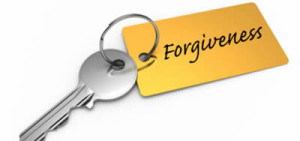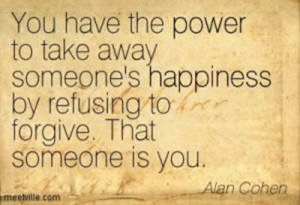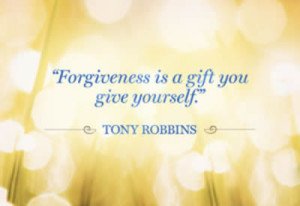“Resentment is like drinking poison and expecting your enemy to die.” Nelson Mandela
 “Forgiveness is not something we should do to be “good”, but as a crucial skill in pursuit of a healthy, fulfilling life.” Megan Feldman Bettencourt
“Forgiveness is not something we should do to be “good”, but as a crucial skill in pursuit of a healthy, fulfilling life.” Megan Feldman Bettencourt
Most people think of forgiveness as being magnanimous enough to look past a grievance or fault. Let’s say, for example, that you and your friend John are supposed to meet for coffee at a trendy café at 1:00. He shows up 25 minutes late without offering an apology, and sits down as if nothing has happened. You are seething inside because you feel disrespected. However, you don’t want to lose his friendship, so you bury the feeling deep within, smile as if nothing has happened, and decide your best option, in order to keep the friendship, is to forgive. You will ‘rise above’ John’s disrespectful behavior by letting it go. It is the right thing to do.
This scenario has everything to do with the standard definition of forgiveness:
“forgive: [transitive, intransitive] to stop feeling angry with somebody who has done something to harm, annoy or upset you; to stop feeling angry with yourself.” (Oxford Advanced Learners Dictionary online)
 However, there may be a crucial element missing from your interpretation of the event. And that is regarding John’s intention. You are assuming that John intended to show disrespect – that he ought to know better. ‘If he respected me, he wouldn’t do that’, you reason. What about checking this assumption out with John? You might be surprised to find out that John had thought the meeting was at 1:30. Or perhaps he knew the meeting was 1:00 but didn’t realize how late it had gotten. Or his watch was wrong. Until you check it out, you do not know if your assumptions are valid. And even if he understood he was late, perhaps he is one of those people (and I have a friend like this) who is constantly getting involved in interesting discussions and situations, and rarely gets to meetings on time – and thinks nothing of it. In other words, in all likelihood, no disrespect was ever intended.
However, there may be a crucial element missing from your interpretation of the event. And that is regarding John’s intention. You are assuming that John intended to show disrespect – that he ought to know better. ‘If he respected me, he wouldn’t do that’, you reason. What about checking this assumption out with John? You might be surprised to find out that John had thought the meeting was at 1:30. Or perhaps he knew the meeting was 1:00 but didn’t realize how late it had gotten. Or his watch was wrong. Until you check it out, you do not know if your assumptions are valid. And even if he understood he was late, perhaps he is one of those people (and I have a friend like this) who is constantly getting involved in interesting discussions and situations, and rarely gets to meetings on time – and thinks nothing of it. In other words, in all likelihood, no disrespect was ever intended.
Deepak Chopra, in Ageless Body, Ageless Mind comments that, “Outside events have no power to hurt you. The hurt comes when an interpretation occurs in your mind. You can live beyond interpretation, in a state of witnessing the pure, untouchable awareness that is the real you.” How you interpret events is the determiner of the effect they have on your emotional and even physical health.
 I read an impactful story in a recent issue of Psychology Today (August 2015) on the subject of forgiveness. Azim Khamisa‘s only son, Tariq, was delivering a pizza one night to members of a teenage gang, and when he refused to give it to them for free, one of the members, a 14 year old named Tony, pulled out a gun and shot and killed him. Azim was understandably stricken with grief at the loss of his son, but instead of condemning his son’s killer, he was determined to understand and forgive. He came to the conclusion, after going through statistics of America’s street wars, that both boys were the victims of the violence for which ‘every American, including himself, was responsible.’ He decided he had to do something about this violence, and reached out to Tony’s grandfather (the boy’s legal guardian) to help him. They created a foundation and speak together at school assemblies to share their message. Azim did this, not because it was the ‘right thing to do’ but because forgiveness was the only way he could extinguish the anguish he felt inside. His workshops are entitled, ‘Forgiveness: The Crown Jewel of Personal Freedom.’
I read an impactful story in a recent issue of Psychology Today (August 2015) on the subject of forgiveness. Azim Khamisa‘s only son, Tariq, was delivering a pizza one night to members of a teenage gang, and when he refused to give it to them for free, one of the members, a 14 year old named Tony, pulled out a gun and shot and killed him. Azim was understandably stricken with grief at the loss of his son, but instead of condemning his son’s killer, he was determined to understand and forgive. He came to the conclusion, after going through statistics of America’s street wars, that both boys were the victims of the violence for which ‘every American, including himself, was responsible.’ He decided he had to do something about this violence, and reached out to Tony’s grandfather (the boy’s legal guardian) to help him. They created a foundation and speak together at school assemblies to share their message. Azim did this, not because it was the ‘right thing to do’ but because forgiveness was the only way he could extinguish the anguish he felt inside. His workshops are entitled, ‘Forgiveness: The Crown Jewel of Personal Freedom.’
A number of studies have confirmed that holding onto grievances correlates with an increase in depression, anxiety and hostility. When you do not forgive, your brain releases all the hormones of the stress response – adrenaline, cortisol and norepinephrine – into the blood stream. These chemicals will eventually produce feelings of helplessness and victimization. Forgiveness, on the other hand, correlates with decreased levels of anxiety, depression and PTSD. Forgiveness also promotes physical healing and heart health.
To continue reading this blog post, click here.
 Alison Etter MEd, RPC, RTC
Alison Etter MEd, RPC, RTC
Counsellor and Healer, Breakthrough Counselling and Coaching
250-324-3040
Website
Email Alison
Alison is a Registered Professional Counsellor with a diploma in Transpersonal Counselling Psychology. Her practice is in Chemainus, BC, and she offers sessions via Skype as well.
See all articles by Guest Author




Hi Elizabeth – i appreciated your comment. I would be curious what specifically ‘went deep’ when you read the article? What insight did you come away with? How will that impact you? Warmly, Alison